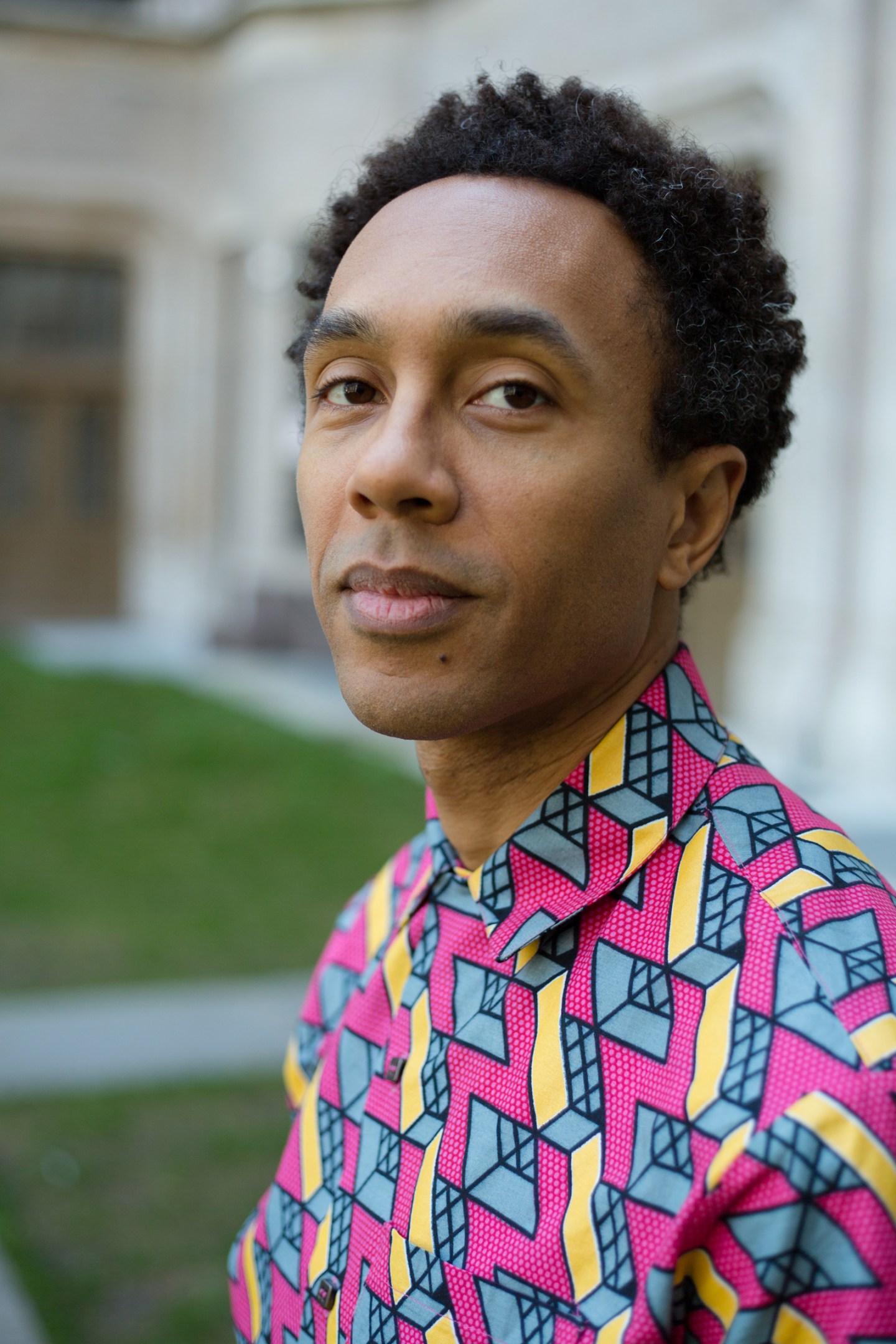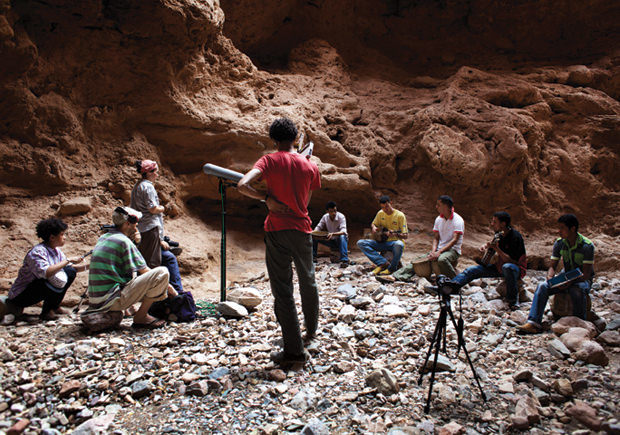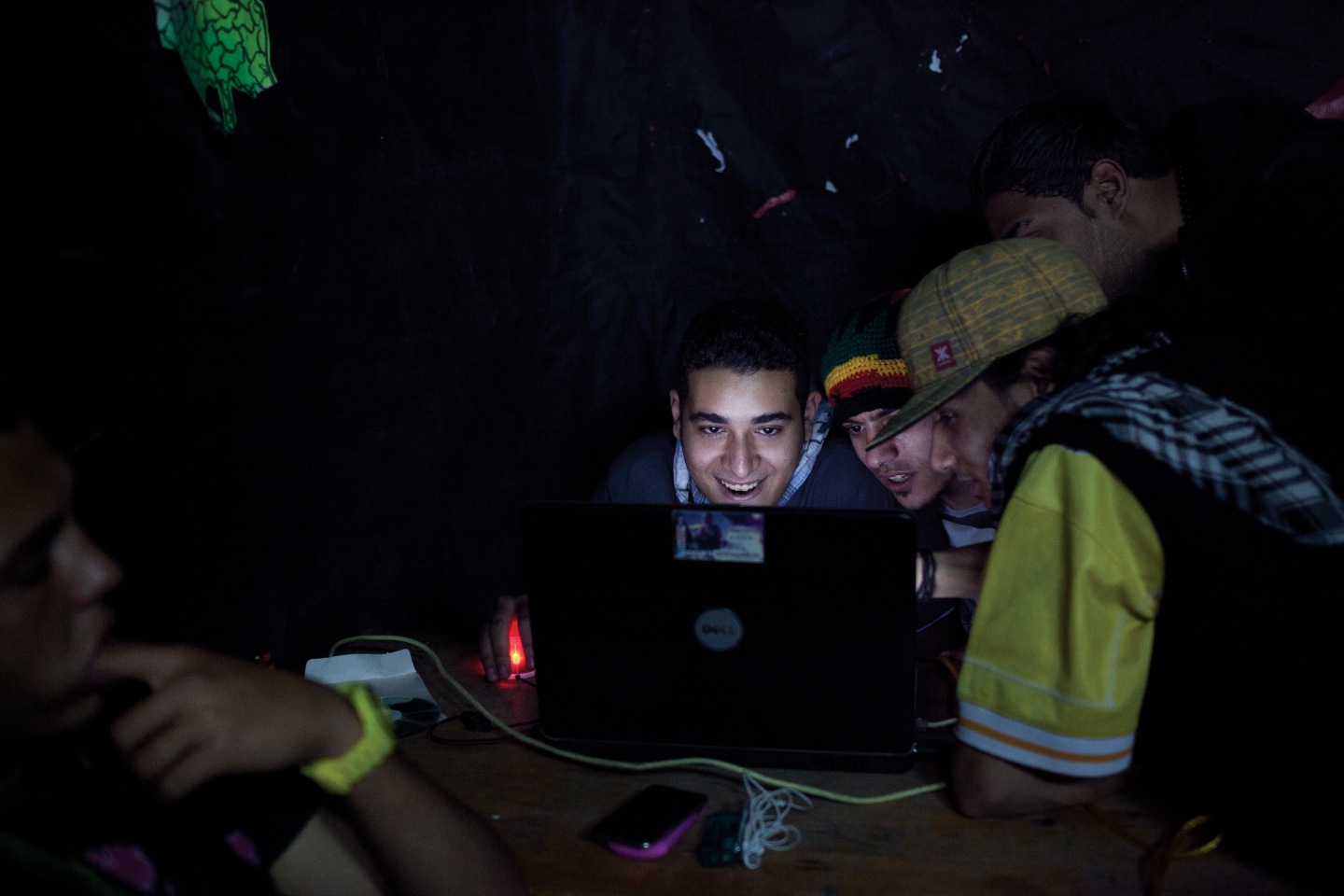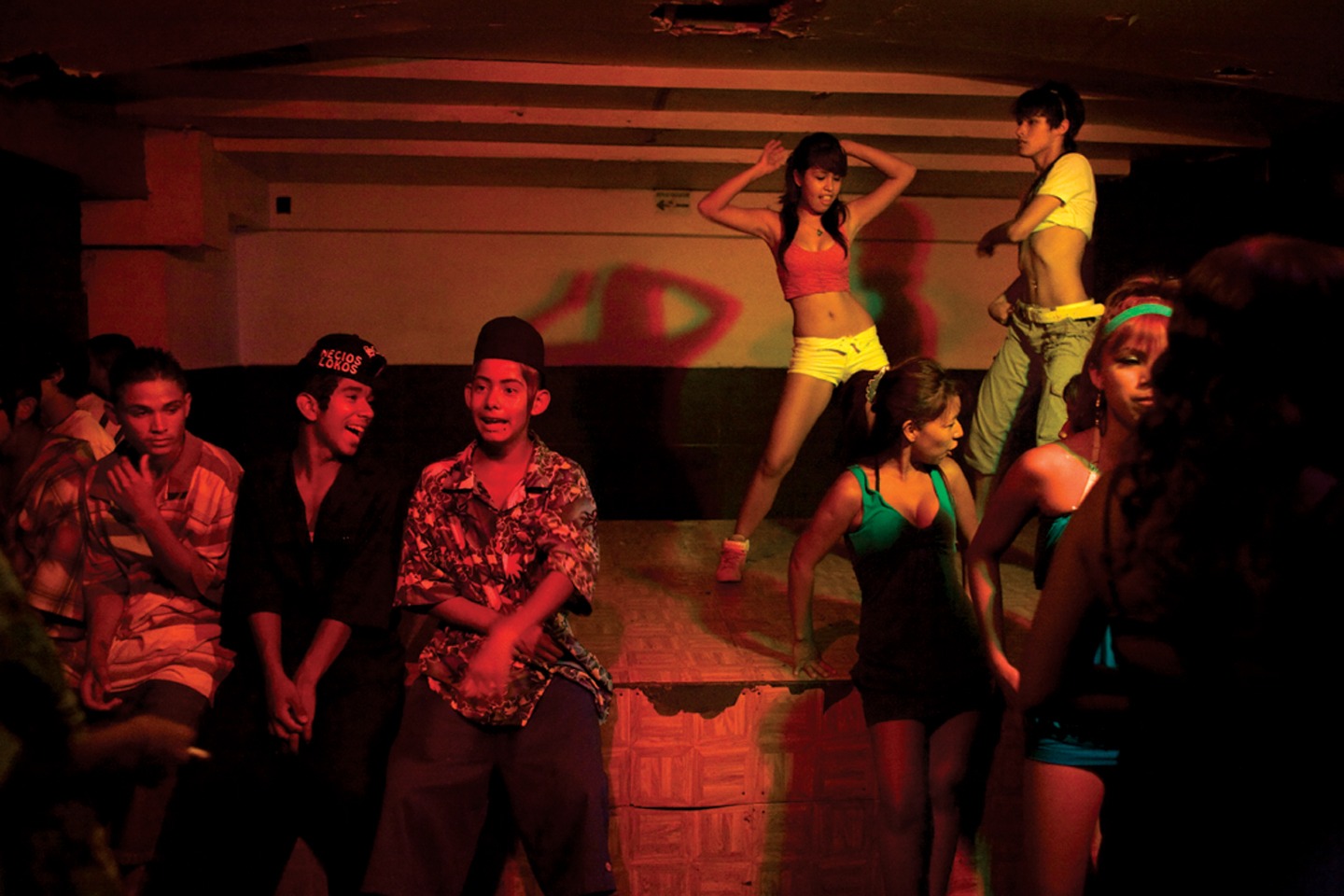Jace Clayton’s New Book Is About Living, Breathing Music Mysteries
A conversation with the globe-trotting author of Uproot: Travels in 21st-Century Music and Digital Culture.
 Max Lakner
Max Lakner
Jace Clayton is a writer, composer, and DJ who performs and releases sonically expansive, conspicuously border-crossing mixes under the name DJ /rupture. He lives in a loft in East Harlem, where I visited him on a recent Monday morning. The room was spacious and bright and divided evenly between boxes of vinyl — his own raw materials — and shelves of the vibrantly patterned fabrics used by his partner, the fashion designer Rocio Salceda.
I had joined them for breakfast to talk about Clayton’s new book, Uproot: Travels in 21st-Century Music and Digital Culture, to be published this month by Farrar, Straus & Giroux. The book is the culmination of Clayton’s last decade or so as an essayist and culture reporter, an itinerant correspondent for outlets like n+1, Frieze, and The FADER, where he has been a frequent contributor and become probably the first person to interview both DJ Khaled and Philip Glass. You might describe the book as a travelogue that’s about living music cultures, rather than tourism or self-actualization. Intrigued by mysterious rhythms or strange, sonic conjunctions, Clayton traces a winding path around the globe investigating scenes both communal and insular, which share only the fact of their having been touched by the new era of pop’s liquidity and what the writer calls “the ungraspable swirl of digital flotsam.”
It’s a remarkable and thought-provoking book, one that ranges widely from the ruins of castles in North Cyprus to the bustling marketplaces of Morocco; from open air cafes in Cairo to dank, makeshift dance parties in Mexico City. Like his reputation-making 2001 mix Gold Teeth Thief, the book also serves as an awestruck celebration of pop music in all its inexhaustible varieties — jarring and disposable, unpredictable and fun. Clayton’s vision of vernacular music in the age of the internet is, I think, the most generous and exciting one available to us, one in which, “refined tastes intertwine with semi-random surf trails to become indistinguishable from each other.” The result, he writes, is a “fertile mess,” in which “all the world’s sonic secrets are out there, clumped irregularly across the internet’s flat and mighty sprawl.”
 Jace Clayton recording in Morocco in 2011.
John Francis Peters
Jace Clayton recording in Morocco in 2011.
John Francis Peters
Your book is one of the rare music-related books that attempts to explore the present, rather than the past. This is maybe rare because it seems like such a doomed endeavor — culture evolves so quickly that you risk seeming immediately outdated. Did this seem like a problem for you? Or was it the whole point?
It’s certainly a tricky proposition, but also a totally necessary one. Because, like you say, so much music criticism is about looking backward at the past and ranking things in a very top-down way. But to me, the present is the most interesting thing about all of this. Today is the most interesting day in music that’s ever happened in the world, you know?
And not only that, but part of the reason I started writing this book is that my DJ career spanned this strange moment from analog records and cassettes and CDs to the era of immaterial music and streaming. When people look back at this present, they’ll see this as an epic shift in what music was. So as a writer, I thought I needed to get this right, to communicate the freshness of this, what it means to be making music in 2016. But because it’s a book, it does need to make sense 10 years from now, 15 years from now — so that was actually something I thought about a lot, even at the sentence level. Like, what’s important to mention and what isn’t? I wanted to choose examples that were timeless in some way but also very significant to this particular moment.
One of the only other recent books I can think of that attempted something similar was Simon Reynolds’s Retromania: Pop Culture's Addiction to Its Own Past, a book that made a lot of compelling points but did so by overlooking a lot of the new music I found most interesting (and readily available).
I had the same problem with that book actually. So much of what I like about popular music is not at all backwards-facing, or it’s never quite so simple. My experience of music is so different from that, so with this book, I thought, let’s talk about people engaged with the new. Even in the Berber Auto-Tune chapter [about the omnipresence of Auto-Tune in Moroccan music], I’m talking about music that’s extremely conservative and backwards-facing in some ways, but also totally not, because it’s also embracing this weird new technology. What I wanted to do with the book was to engage with that joyous messiness of the present. The idea being, there’s lots of things happening; what if we go through some of the most interesting ones and whatever picture emerges at the end, that’s kind of what I’m interested in. It’s the opposite of a “12 Things Happening In Music You Need To Know About Right Now”-sort of approach.
The music you write most about falls under the rubric of World Music 2.0, which you define as “an Internet-native structure that hews to the logic of the information economy.” You write that “knowing where to find it is more valuable than making it.”
I stand by those things. I don’t think I coined that term — it was something a lot of bloggers back in the glory days of music blogging were talking about. But I use it to contrast this stuff with the first wave of World Music, which was invented by music executives scrambling to coin a genre after Paul Simon’s Graceland was a hit — it was a marketing term originally. So World Music 2.0 refers to the kids all over the world with FruityLoops on their laptops, who are watching Taylor Swift videos on YouTube and listening to whatever traditional music their parents are into, and who open up this new production software and think, what can I do to participate in this?
There’s something very ‘folk’ about it — it’s kind of the folk music of the internet era. Youth with computers emulating global pop or making weird versions of some local thing that only they know about. One of the things I’m interested in is finding those moments or scenes and spending enough time with them to provide context, so that even if people don’t hear anything legible in it — they just hear weird drums or whatever — I can hopefully communicate what’s “folk” about it, or at least what’s valuable. That’s part of the project, part of what I want to do. No one is going to like all the music that I’m writing about. But hopefully it’s presented in such a way that, even if they don’t like it, they understand what’s new and fascinating about it. Whether it’s crazy Aztec-inspired rave music in Mexico or whatever.
 Shaabi musicians in Cairo.
John Francis Peters for The FADER
Shaabi musicians in Cairo.
John Francis Peters for The FADER
This book is also unusual for being more or less optimistic about the future of music, which seems almost contrarian these days. It’s like Laurie Anderson says in her blurb: “I’m so glad to read such an upbeat version of the future of music and the music-listening public.”
I joke that outside of music I’m a total pessimist, but, when it comes to music, I’m absolutely optimistic. Because it’s a form that’s always evolving and always full of surprises. Music is very giving in that way.
You do allow for the fact that not all of the scenes you write about will thrive, though, or even survive. There’s the dance scene in Mexico City that essentially falls apart the week after your article about it hits newsstands.
Yeah, that was a moment that happened and then was gone. One group became famous and toured and got on TV and nobody else really did. And in that sense, my take on this stuff isn’t always just a blanket optimism. That was a very fertile scene for a while that sprouted all of this other stuff. But music is also always slipping away. Maybe it isn’t always “sustainable.” Maybe it isn’t always going to be feeding these people twenty years later. But that improvised, throw-away quality of a life in music — there’s something very beautiful about that in itself.
You write, “I don’t want to haggle over how many micro-cents I get paid per stream or other token gestures toward compensation. I want the giants to fall even faster so we can see what weird flowers start blooming in the spaces left vacant.” I agree with this, but I also wonder if, without the profit motive, James Brown or Merle Haggard or Gucci Mane would ever have made music at all.
I don’t think anyone starts out for that reason, just for profit. I think the initial impulse is usually closer to, “I have these sounds in my head,” or “I want to be seen on stage,” or one of these other non-financial reasons. But one of the great things about music is that it sort of sits on the border between art and consumer service. DJing, especially: that’s my job. There’s not this precious attitude of, this is my art so nobody touch it. Right from the beginning you have one foot in that commercial world.
But I hear what you’re saying. Competition drives innovation, and that’s real. And can often lead to very surprising results. I don’t talk much about Jamaican music too much in the book, but one of the things that’s so interesting about Jamaica is that it’s this hyper-competitive environment, which encourages people to make all sorts of wild artistic choices, and push themselves stylistically.
You also write that you prefer to leave questions about the future of music to sci-fi writers and “get nervous when app developer or industry cats say they’ve found answers.”
I say that partly because the book is focusing on the present. I keep hearing these future projections, and my own experience is that there’s just so much happening right now, let’s just focus on that. I think that kind of writing — projecting about the future of music — is often just taking what’s happening right now and extrapolating from it. And that isn’t very interesting, and it isn’t how music evolves. So some of the chapters in the book are deliberately counterintuitive interpretations of the present and how things might go. So by referring to science fiction authors, I’m saying: Leave it to the people who are really playing with creative possibilities.
The actual future course of music is obviously going to surprise us in ways we couldn’t have imagined. Auto-Tune is a really clear example of that. It starts off as this very tidy vocal correction software meant to be invisible, and then eventually Cher’s producers use the effect, use it a little too much, and it sounds great. And three years later you hear it in Moroccan wedding music, you know? You could not have guessed that! You can’t guess the future of music based on the past. It doesn’t work that way.
 Tribal guarachero fans in Mexico.
John Francis Peters for The FADER
Tribal guarachero fans in Mexico.
John Francis Peters for The FADER
What do you think the task of music journalism should be?
I always want to gain some sort of insight. So on a very fundamental level, I think music writers should write about music. Most of the features you read are: I spent four hours with this famous person. It’s telling you about the writer’s day in the glow of some celebrity, and then if you’re lucky they’ll analyze some lyrics.
I really want to talk more about how sound is working to create meaning in a song. Let’s really think about music, which ends up being radical because so few music writers do it. That’s why I write in the book about, like, Whitney Houston’s melisma. Everyone’s already heard “I Will Always Love You” a million times, but I’m hoping if we slow it down and move deliberately enough, people can hear it in a different way. And I hope not to repeat the structure of, “This person is about to blow up, they’re going to be huge next month.” Because the question becomes, why does it matter? What else are they doing that’s interesting, or would be interesting even if they weren’t famous? I find most music journalism unengaging for precisely these reasons.
If you click over into reading art criticism, it’s a whole different thing — you can bring in all sorts of theory and philosophy. Whereas commercial music journalism often reads like celebrity puff pieces. Which doesn’t help the music, and doesn’t even really help the celebrity in question. Kanye West, for instance — people want to talk about his ego and this or that, but actually there’s a lot going on musically in even his newest stuff. There’s an odd fear of music in most music journalism. Partly because of the economy of music writing. But also partly because music is amorphous, and more emotional than intellectual. And it can often be more difficult to talk about nuances of sound. And people generally go with what’s easier. There are obviously exceptions.
About a decade ago, it seemed like you could instantly download any album you wanted just by Googling its title. I thought it would be that way forever, that the industry couldn't possibly “put the toothpaste back into the tube” (an expression invoked a lot at the time). But then they sort of did, didn't they? The industry lives on, zombie-like, and music distribution on the internet has become less fluid, more regulated. Does that concern you?
Yeah, it does, certainly. What happens to culture when you put in a smaller and smaller number of corporate containers? And this taps into the larger idea of the internet becoming more and more like TV. And as a result, yeah, some of the unruliness of 10 years ago is gone, which is weird and a little troubling. I’m making this online listening guide for the book, precisely because so much of what I write about isn’t available on Spotify or iTunes or whatever.
But there’s always going to be excess weirdness, something else outside. And one of the reasons I’m not too worried about this is: most artists don’t start out with a manager, or with a professional plan. They start out with weird edits on SoundCloud or a party that maybe evolves into something or maybe doesn’t. So much of music still primarily operates in club spaces, public spaces. When I think about fluidity, I’m thinking about the way people gather around music as well. So the online thing is one aspect, but organizing shows and events and listening to music in public is something else entirely. With rap, for instance, there’s still this very strong mixtape economy.
So to go back to that line, “I want the giants to fall even faster so we can see what weird flowers start blooming in the spaces left vacant.” Why haven’t the giants fallen? Why won’t the culture industry collapse?
The question is, what won’t collapse? The handful of artists making money for the labels and propping them up — they’ll definitely be the last ones to go. And sometimes I’m very interested in those artists. But one of the things I’m trying to do with the book is spend a few paragraphs on Beyoncé and Jay Z but then also spend a few paragraphs on Fugazi or people even further off the map. I try to be as honest as I can about my ambivalence with that stuff. Because ambivalence is what I’m left with. Pure ambivalence, all the way down.
But I hope one of the takeaways of the book is that you can always find music for yourself. Strange sounds are never that far away. Part of living in a city is that you’re constantly hearing unidentifiable, weird music. Maybe that music is bachata, Dominican guitar music pumping out of the bodega on my street; or most of the pretzel and falafel vendors around here are Egyptian and play shaabi music. And what happens if you decide to follow that sound around the corner? What happens if you approach someone playing music you don’t know and say, “What is that?” The places of music discovery are many — it’s not just a function on a streaming service. So many epiphanies for me are these very personal moments, where I’ll just start talking to someone who knows something I don’t.
It’s about curiosity; it leads to interesting things. People love it! It’s their music that they’re playing in a public or semi-public space, and people are excited to share something close to them, something they love. People are super open. The only exception I’ve found are the West African music store owners up in Harlem. They’re just not excited to talk to me at all. “Can I listen to this CD?” “No.” [Laughs] But walking by a nail salon and hearing music I don’t recognize from Guinea or something? I’ll always pop my head in and say, “Excuse me, what is this?” And then I’ll know..